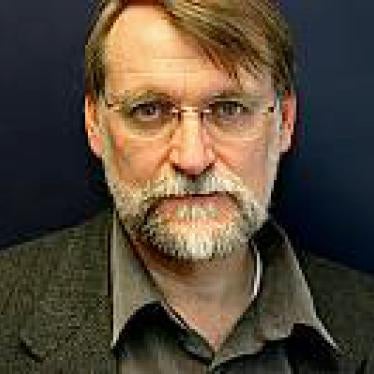During his late April visit with German Chancellor Angela Merkel to Turkey, European Council President Donald Tusk lavished praise on his hosts, saying, “Turkey is the best example for the whole world on how we should treat refugees.”
Turkey, indeed, deserves the world’s gratitude for keeping its border more or less open to Syrian refugees until early 2015 and for tolerating—with precious little support from the rest of the international community—between 2 and 3 million refugees. But Turkey’s recent actions belie Tusk’s superlatives, and EU efforts to block asylum seekers reveal his adulation as self-serving.
Turkey’s once-open door with Syria is now a concrete wall and razor-wire where Turkish border guards are shooting and beating Syrian civilians trying to escape the violence. In a new report Human Rights Watch documents seven incidents since early March in which Turkish border guards killed five people, including a child and woman, and seriously injured 14 others, including three children.
One of those shooting incidents was on April 17, a week before the Merkel-Tusk visit, near the informal Khurbat al Juz–Güveççi border crossing. A survivor told us: Suddenly, when we were about 500 meters from the border wall, we heard automatic weapons fired from the direction of the wall and bullets landed all around us… We all threw ourselves onto the ground, covering the children. I was lying close to my sister and my cousin and the bullets hit them while we were lying down. They both stopped screaming and shouting. I knew right away they had been killed.
He said that he and a cousin and the cousin’s 9-year-old daughter and 5-year-old son were also shot and wounded.
And what is the European Union’s role in all this? In March, it finalized a deal with Turkey to significantly reduce the number of Syrian and other asylum seekers reaching the EU. The EU said it would return --and Turkey said it would accept--“all new irregular migrants crossing from Turkey into the Greek islands.” For every Syrian returned from Greece, the EU would take another Syrian from Turkey.
So far, the deal’s deterrent effect is working; the number crossing the Aegean has dropped dramatically. But if no Syrians reach Greece by boat and the war in Syria drags on, Turkey will be left with an ever-growing refugee population. Not a very attractive deal for Turkey.
So, the EU also promised “to work with Turkey in any joint endeavor to improve humanitarian conditions inside Syria which would allow for local population and refugees to live in areas which will be more safe.” While no one would quarrel with working together to improve humanitarian conditions inside Syria, the purpose for such a safe area is clear not only from the deal’s overall containment goal, but also from an earlier European Commission outline of its objectives to “prevent further arrivals of irregular migrants to Turkey and irregular departures of refugees and migrants from Turkey to the EU.” A “more safe” area in Syria presumably would mean Syrians would not have to flee to Turkey or the EU. Problem solved.
But a Human Rights Watch investigation has already shown that the area Turkey markets as a safe zone is, in fact, more of a death trap, with ISIS military gains into that area forcing tens of thousands of Syrians once again to flee toward Turkey’s freshly cemented wall and trigger-happy border guards.
On May 5, airstrikes hit a camp for internally displaced Syrians at another point along Turkey’s increasingly impenetrable border, in Idlib province, killing at least 20 civilians and injuring at least 37 more. Human Rights Watch had previously documented that Syrian government shelling hit camps for displaced people near the town of Bidama in mid-April.
Protecting refugees involves more than putting people in camps and feeding them. Most fundamentally, it means respecting the principle of nonrefoulement, the obligation underlying all refugee protection that forbids any government from forcing people back to places where their lives or freedom would be threatened. This includes rejection at borders that would expose them to such serious dangers.
When the EU uses inducements of visa-free travel for Turkish nationals, a renewed and accelerated path toward EU membership, and cash to get Turkey to keep Syrian refugees from crossing into the EU; when its member states build fences and close their own borders; and when the EU signals to Turkey that it’s okay to contain Syrian asylum seekers in a war zone, it bears more than a little political responsibility when Turkey closes its border. This may help explain, but can never justify, EU leaders’ effusive praise for Turkey and silence in the face of the use of deadly force to prevent the flow of asylum seekers into the country.
Politics cannot offset the wall, the pushbacks, the shootings. If nothing else, honesty requires a review of an increasingly morally bankrupt deal.
Until then, neither Turkey nor the EU set “the best example” for how to treat refugees.








